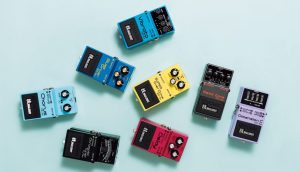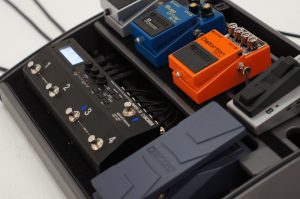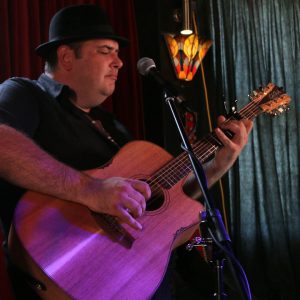
Essential Guitar Pedals: A Beginner’s Guide
Ready to dive into the world of guitar pedals but don’t know where to start? Here’s a quick guide about where to start.
There’s something special about playing an acoustic guitar – feeling the resonant vibration of the body as you strum some strident chords, the strings ringing sustaining under your fingertips, the boom of the bass projecting from the sound hole.
If you’re looking to take your acoustic game to the next level, whether it’s getting help taming feedback, learning how to amplify your acoustic to play on-stage, or learning to loop and sing along with yourself, our resource centre is here to help!

The Cube Street range is virtually synonymous with busking and street performance. We’ll go so far as to wager that there isn’t a popular waterfront or street corner in the world where you won’t see a Cube Street at the feet of the talented musicians entertaining passers-by!
There are two amps in the Cube Street range – the original Cube Street and the Cube Street EX. Which one you choose depends on your needs – are you a solo performer running backing tracks from your phone? Do you use just a single guitar or have you got multiple instruments to plug in? Or do you have several band members performing together?
We’ve compiled some of the key features of both the Cube Street and Cube Street EX to help you figure out which one works for your situation – and there’s also a handy summary table at the end of the article!

So you’ve honed your acoustic guitar chops, and you want to take your playing to the stage!
Acoustic guitars sound great, but by their very definition they’re, well, acoustic – so if you want your audience in the club, café or bar to hear what you’re playing on your acoustic guitar, you have to amplify it.
If you’re looking to take your live playing to the next level, here are a few different ways to amplify your pickup-equipped acoustic guitar for live performance, and the pros and cons depending on what your needs are. With a bit of research you can determine what works best for you, your sound and your intended audience. Let’s go!

The BOSS Acoustic Singer series of amplifiers is designed for the guitarist/vocalist who needs one self-contained unit for handling all of their amplification needs; acoustic guitar, vocals, maybe even effects and backing tracks. The idea is that you can rock up for a gig with your amp in one hand and your guitar case in the other hand have pretty much everything you need to perform.
There are three amps in the series: ACS Pro, ACS Live, and the new ACS Live LT.
The ACS Pro sits at the top of the range, with a 100W woofer and 20W tweeter affording you the power to provide stage volume and play to bigger crowds.

In recent years, we’ve seen a huge boom of popularity in acoustic guitars. Because of this, it should come as no surprise that we’ve also seen a surge of popularity towards acoustic amplification.
Acoustic amps cater to the needs of players wishing to amplify the sound of their prized acoustic guitar. They are used either onstage, or to take advantage of the lush soundscapes that can be created by adding effects such as reverb, delay and chorus to an acoustic sound.
A question often asked by many acoustic guitarists is “Why exactly do I need an acoustic amp?”


There is something special about playing an acoustic guitar: feeling the body vibrate next to your body, the strings resonating and sustaining under your fingertips, the boom of the bass projecting from the body. It can be very therapeutic to play “unplugged” and this connection is a big reason why the acoustic guitar is still so popular today.
Each individual acoustic guitar is a unique instrument. From the soundhole to the soundboard, the bracing to the tone wood used… finding THE ONE can take years – even a lifetime! That’s not even looking at the shape of the guitar – Parlour, Dreadnought, Jumbo, 00, 000?
What about the strings? Nylon or steel? If you take this much care in selecting your acoustic, shouldn’t it have its own dedicated amplification?

Ready to dive into the world of guitar pedals but don’t know where to start? Here’s a quick guide about where to start.

Choose The Right Loop Pedal in 5 minutes! What is looping? It’s the secret weapon that artists as diverse as Ed Sheeran, Tash Sultana, and

So, you’re rocking a BOSS or Roland amp with a bunch of cool features and effects on board. You want to use these features and

The OD-200 Hybrid Drive brings together decades of experience and innovation in overdrive and distortion to create a totally new breed of pedal. The cutting

Let’s start with the concept behind the BOSS MS-3. MULTIEFFECTS We’re all familiar with the concept of a multieffects unit – it’s an all-in-one unit

The awesome DD-200 is the newest multi delay from BOSS. If you’ve seen its powerhouse big brother, the DD-500, you might be asking, why would I

On the face of it, an EQ pedal may seem pretty redundant – it technically doesn’t make any sound in and of itself, and you

It’s really might be the best era to be a guitar player. Technology has made almost every aspect of playing guitar so much more convenient.

The BOSS Acoustic Singer series of amplifiers is designed for the guitarist/vocalist who needs one self-contained unit for handling all of their amplification needs; acoustic

So you’ve honed your acoustic guitar chops, and you want to take your playing to the stage! Acoustic guitars sound great, but by their very

It’s funny – everyone has an opinion on the trusty ol’ Metal Zone. And we think we know why – it’s because almost everyone has

The 4 Cable Method (4CM), is a term usually heard in guitar-related conversations. It describes a way to connect your guitar to your effects pedals and

Headphones are one of the greatest technological creations of the 20th century. If you don’t think that’s true, take a look in any bus, train,

Why Do I Need Bass Effects For My Bass Playing? If you’re playing bass guitar in a band or musical project of any kind, one

Upgrade Your Tone with a Waza Craft Analog Delay For a long time, savvy guitar players have known about the special magic that the vintage BOSS DM-2

If you’re a musician and have been around for a while, chances are you’ve seen or owned a BOSS Tuner. Maybe you’ve come across one of

The BOSS DD-500 Digital Delay is BOSS’ flagship, multi-mode delay pedal. With exceptional sound quality and customisable flexibility, the DD-500 is an absolute powerhouse of

For over 35 years, Roland guitar synthesizers have provided guitar and bass players with the means to coax astonishing sounds from their instruments. There’s something